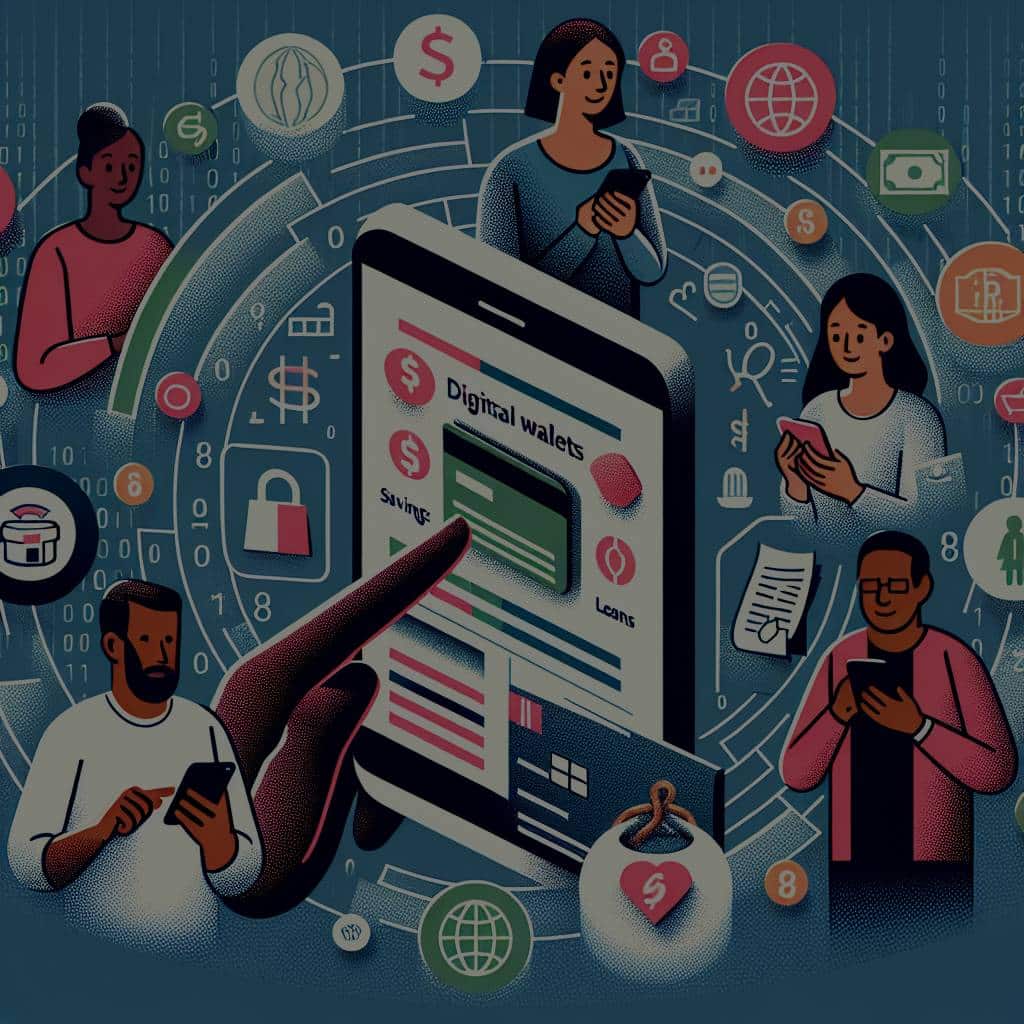How Can Digital Wallets and Fintech Apps Enhance Financial Inclusion?

Access to financial services is a cornerstone of modern society. Yet, many people, particularly those in lower-income brackets, often find themselves left out of traditional banking systems. This is where financial inclusion comes in. It’s a movement to make savings, borrowing, payment, and insurance services accessible to everyone, regardless of their income level. An increasingly popular method of promoting financial inclusion is through technology, specifically, digital wallets and fintech apps.
The Role of Digital Wallets in Financial Inclusion
Digital wallets are electronic devices or online services that allow individuals to make electronic transactions. They work similarly to a physical wallet but instead of carrying around cash and cards, all financial transactions, data, and information are stored digitally.
Also to read : What’s the Future of Lab-Grown Meats and Alternative Proteins?
The growth of digital wallets has been phenomenal. According to a study by Grand View Research, the global digital wallet market size was valued at USD 1.04 trillion in 2019 and is expected to expand at a compound annual growth rate (CAGR) of 13.5% from 2020 to 2027.
One of the primary reasons digital wallets are so popular is because they provide a viable alternative for those who are unbanked or underbanked. Rather than relying on traditional banks, individuals can access financial services directly from their mobile device. This is particularly useful in regions where banking infrastructure is not fully developed or people live in remote areas far away from physical bank branches.
Also to discover : What’s the Impact of Social Robotics on Enhancing Learning for Autistic Children?
Digital wallets also provide a level of convenience unmatched by traditional banking methods. They allow for quick, easy, and secure transactions that can be made anywhere at any time. This can include paying bills, sending money to friends and family, buying goods or services, and even investing in stocks or cryptocurrencies.
But perhaps the most significant advantage of digital wallets is their ability to offer financial services to people who are typically excluded from traditional banking systems. They require less paperwork to set up, do not require a minimum balance, and offer services that are often less expensive than those offered by traditional banks.
Enhancing Financial Inclusion with Fintech Apps
While digital wallets play a significant role in promoting financial inclusion, they are just one part of the puzzle. Another critical component is the rise of fintech apps.
"Fintech," short for financial technology, refers to the use of technology to deliver financial services. Fintech apps have been revolutionary in democratizing access to financial services and promoting financial inclusion. They have the power to provide individuals with the tools and resources they need to manage their finances, save money, make investments, and more.
Fintech apps have several advantages over more traditional financial services. Firstly, they are typically more accessible. You can use fintech apps anywhere you have an internet connection, making them especially useful for people in remote areas or those who do not have easy access to brick-and-mortar banks.
Secondly, many fintech apps provide more straightforward and more intuitive user experiences than traditional banks, which can often be daunting and confusing. This user-friendliness can help to break down barriers and make financial services more approachable.
Thirdly, fintech apps often offer more innovative and flexible services than traditional banks. This includes everything from peer-to-peer lending platforms to robo-advisors to cryptocurrency wallets.
Overcoming Barriers to Financial Inclusion through Digital Wallets and Fintech Apps
Despite the significant strides made towards financial inclusion through digital wallets and fintech apps, there are still numerous barriers to overcome. These include technological challenges, regulatory issues, and cultural and behavioral factors.
Technological challenges are perhaps the most apparent. While smartphones and internet access have become increasingly common, they are by no means universal. Even in regions with relatively high levels of technology adoption, there can be disparities in access to technology, known as the "digital divide."
Regulatory issues can also pose significant challenges. Many countries have strict regulations around financial services, which can make it difficult for digital wallets and fintech apps to operate. There is a need for regulatory frameworks that support innovation while also protecting consumers and maintaining the stability of the financial system.
Cultural and behavioral factors can also be significant barriers. Many people, particularly those in older generations, may be reluctant to adopt new technologies or change their financial behaviors.
The Future of Financial Inclusion
The role of digital wallets and fintech apps in promoting financial inclusion is only set to grow in the coming years. With technological advancements, increased smartphone penetration, and more supportive regulatory environments, it’s likely that digital financial services will become even more widespread and accessible.
In the future, we might see even more innovative solutions to promote financial inclusion. For example, artificial intelligence (AI) and machine learning could be used to provide personalized financial advice and support, further breaking down barriers to financial services.
In sum, while challenges and barriers remain, there is no doubt that digital wallets and fintech apps have already changed and will continue to reshape the landscape of financial inclusion, providing more people with access to the financial services they need to live and thrive.
Advancements in Financial Inclusion Through Digital Wallets and Fintech Apps
The advancements of mobile banking, digital payments, and financial literacy tools have made financial management more accessible and efficient for individuals. These advancements have been achieved through the innovative efforts of a growing number of fintech companies. Digital wallet and fintech app providers have been working tirelessly to increase their outreach and improve their services, targeting the financially excluded and underbanked populations.
Digital wallets address the challenges of access and convenience for consumers who either can’t or choose not to maintain a traditional bank account. They offer secured digital payment systems that have significantly reduced the need for physical cash transactions. Services like money transfers, bill payments, and mobile recharge are made much more straightforward, eliminating the need for users to visit a physical location. Additionally, digital wallets have also introduced features like savings accounts and investment options, making them a one-stop solution for all financial needs.
Fintech apps, on the other hand, are reshaping the way we understand and interact with financial services. They offer easy-to-use interfaces, personalized financial advice, and an array of services from loans and investments to insurance and beyond. Some apps have even incorporated financial literacy programs, helping users improve their understanding of financial concepts and manage their finances more effectively. Fintech apps are transforming financial services from being intimidating and complex to accessible and user-friendly.
Both digital wallets and fintech apps are leveraging the ubiquity of mobile phones to help more people access financial services. By making banking services available on personal devices, they are bridging the gap between traditional banking systems and the needs of the modern consumer.
Conclusion: The Way Forward for Financial Inclusion
The landscape of financial inclusion has significantly shifted with the rise of digital wallets and fintech apps. Financial services that were once exclusive to the realm of traditional banks are now being democratized, making them accessible to people who had been left out of the financial system.
However, this is just the beginning. The fintech sector is set to continue innovating, with potential advancements that could further revolutionize financial services. Artificial intelligence and machine learning, for instance, could enable more personalized services, allowing users to have a tailor-made banking experience.
Despite the remaining barriers, the central bank and other financial institutions need to recognize the vital role that digital financial services play in promoting financial inclusion. It’s essential to create a supportive regulatory environment that encourages innovation while also protecting consumers. Furthermore, efforts need to be made to address the "digital divide" and increase financial literacy, ensuring that everyone can benefit from these digital advancements.
In conclusion, digital wallets and fintech apps have fundamentally changed the financial landscape, enabling millions of people worldwide to access and manage their finances. As we move forward, these digital platforms will play an increasingly crucial role in driving financial inclusion, helping everyone, regardless of income or location, to access financial services.
